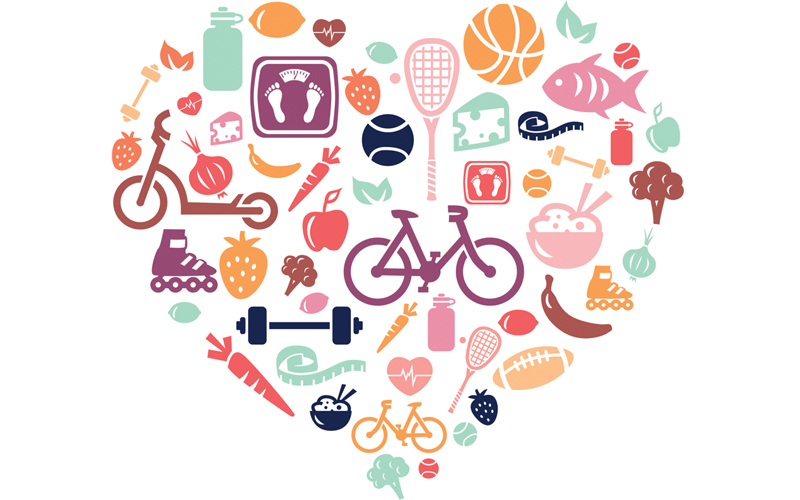
by guest blogger Dawna Stone, certified health coach, winner of The Apprentice: Martha Stewart, and author of The Healthy You Diet
We all strive to be healthier, feel better, and look younger. Leading a healthy life benefits us both physically and mentally. Some benefits include healthy weight, glowing skin, bright eyes, improved thinking, increased energy, better sleep, and improved mood.
Want to take control of your health? Follow these 7 tips for a healthy you:
1. Remove highly processed packaged foods. Processed foods were originally seen as convenient time-savers for busy families. Somewhere along the way, however, additives, preservatives, enrichments, salt, sugar, and ersatz ingredients with no nutritional value were pumped into cereals, baked goods, frozen meals, and snack foods.
Processed foods contain a host of empty calories and none of the vitamins, minerals, and nutrients that our bodies need to maintain cell growth and fight diseases that a healthy, balanced diet supplies.
The easiest way to drop excess weight and to start on a path to better health is to cut out processed foods and instead eat more fresh vegetables and fruits, healthy grains, and lean proteins.
2. Stock a healthy pantry. Stocking your pantry and refrigerator with healthy foods is the first step to eating better. If you’re determined to get healthy, taking the time to clean out your pantry will not only help make space for more wholesome and nutritious foods, but will also help remove the foods that may be sabotaging your health.
Stock your pantry and refrigerator with a variety of fruits, vegetables, nuts, seeds, lean proteins, and healthy grains. Once you embrace these healthier foods, you’ll be amazed at how much better you feel.
Take 30 minutes to sort through the food in your kitchen and eliminate items that you know are unhealthy—processed foods, sugar-laden snacks, diet beverages, and so on. Just a little pantry and refrigerator modification can go a long way toward improving your diet and therefore your health.
3. Get moving. Exercise! A regular exercise program will reduce stress, boost your energy level, improve your mood, and help you get a solid night’s sleep. But getting started or staying consistent isn’t always easy.
Making exercise fun is one way to keep motivated and stay on track. The exercise you choose needs to be one you enjoy. Too often, people select an exercise, such as running, for its calorie burn rather than for its enjoyment. Although you have good intentions, an exercise program you don’t enjoy won’t last.
Finding an exercise program that you truly enjoy is the first step to maintaining regular physical activity. Try activities like swimming, walking, biking, or hiking. Participate in a yoga or Pilates class. Take tennis lessons or join a local tennis club or team. There are so many options. Take the time to find the one that works best for you. And remember, if you’re new to exercising or haven’t worked out in ages, start slowly and build up gradually.
4. Don’t skimp on sleep. Sleep plays an important part in our overall health. Not only does it play a vital role in quality brain function, but also a good night’s sleep improves memory, decreases stress, increases creativity, enables better athletic performance, and reduces anxiety and depression.
Sleep plays an important role in weight loss, too. According to a 2011 study published in the journal Obesity, people who stay up late consume almost 250 more calories per day than those who go to bed early. That’s an additional 91,250 calories, equivalent to 26 pounds a year!
Train yourself to go to sleep at the same time every night and get a solid seven to eight hours of sleep. And avoid watching TV or reading on electronic devices; the glow from the lights stimulates your brain and slows down the release of the sleep-inducing hormone melatonin. Instead, read a printed book in a room with low lighting or listen to some quiet music. Having a regular bedtime and a bedtime routine will help you get the sleep you need for health and weight loss.
5. Buy organic. Organic foods are free from hormones, antibiotics, chemicals, and pesticides. By eating organic you limit your exposure to these toxic chemicals. Start by replacing the foods that tend to have highest levels of hormones, chemicals, or pesticides: fruits, vegetables, meats, and dairy.
Remember to look for foods that are certified organic and not foods that say “made with” or “contains” organic ingredients on the label, as these foods may only have a small number of organic ingredients. Remember that labels like “natural,” “whole,” or “healthy” don’t necessarily mean “organic.”
You may notice that eating organic will cost you more than eating nonorganic. If your budget doesn’t allow for always buying organic, try to buy organic for the fruits and vegetables that are known to contain high amounts of pesticide residue, such as apples, bell peppers, celery, cherry tomatoes, cucumbers, and grapes.
6. Practice conscious eating. As our lives become more hectic, we often become less aware of the food we’re eating. We drink coffee and eat a bagel on our way to work, inhale a sandwich while replying to emails from our desk, or scarf down dinner while watching TV. Unconscious eating doesn’t just make us consume more food; it also takes away the pleasure of truly enjoying good food.
To become more aware of the food you’re consuming and become more conscious of the flavor and texture of your food—making the process of eating one of true satisfaction—try eating only in designated locations meant for dining. At home, eat at the kitchen or dining room table. At work, find somewhere other than your desk to eat. The location doesn’t matter, as long as you’re not eating and working at the same time.
For an extra boost of conscious eating, spend a week writing down everything you eat in a food journal. Just the act of writing it down will make you more conscious of the foods you consume.
7. Cut back on sugar. Too much sugar cannot only sabotage your weight-loss goals, but also your health. We all know that our favorite sweet treats like cookies, ice cream, and candy are loaded with sugar. You may, however, be surprised to find that many items you never expect to also contain excess sugar, including salad dressings, crackers, condiments, and cereals—even the whole grain varieties!
Refined sugar has no nutritional value and has been linked to obesity, depression, hypertension, high blood pressure, hypoglycemia, headaches, fatigue, diabetes, acne, and stiffening of arteries.
The first step toward reducing your sugar intake is simple: Pay attention to what you are eating by reading the nutrition labels. And remember that sugar isn’t always listed as “sugar” in the ingredients list. Sugar goes by many names and can often be disguised as corn sweetener or corn syrup, cane juice, dextrin, dextrose, fructose, glucose, high-fructose corn syrup, lactose, maltodextrin, maltose, and sucrose, among others.
When you eliminate or reduce the sugar in your diet, you’ll notice your energy levels are more constant. You’ll have fewer mid-afternoon crashes, the lethargy that follows big meals will disappear, and you’ll feel better all day long.

Dawna Stone is a health, fitness, and wellness expert who founded Women’s Running magazine and the Women’s Half Marathon Series (she sold both companies in 2012). She won NBC’s The Apprentice: Martha Stewart in 2005 and has hosted “Health and Fitness Talk with Dawna Stone” on Sirius Satellite Radio as well as “Healthy Living with Dawna Stone” on Fox. As an American Council and Exercise (ACE)–certified health coach, Dawna has served as a celebrity spokesperson for the American Heart Association and contributed health and wellness articles to numerous newspapers and magazines. An avid runner and triathlete, she lives in St. Petersburg, FL, with her husband and two children.




No comments yet.